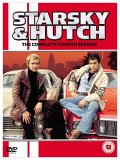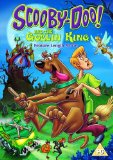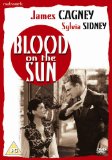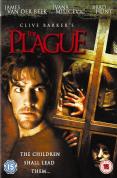![Harvey [4K Ultra HD] [Blu-ray]](/pictures/1169000.jpg) Harvey | Blu Ray | (01/09/2025)
from £21.98
| Saving you £N/A (N/A%)
| RRP
Harvey | Blu Ray | (01/09/2025)
from £21.98
| Saving you £N/A (N/A%)
| RRP James Stewart gives one of his finest performances in Harvey, the lighthearted film based on the Pulitzer Prize-winning play. Stewart stars as the good-natured Elwood P. Dowd, whose constant companion is Harvey, a six-foot-tall rabbit that only he can see. To his sister, Veta Louise, Elwood's obsession with Harvey has been a thorn in the side of her plans to marry off her daughter. When Veta Louise finally decides to put Elwood in a mental hospital, a hilarious mix-up occurs, and she finds herself committed instead. It's up to Elwood to straighten out the mess with his kindly philosophy, and his imaginary friend, in this popular classic that features a Best Supporting Actress Academy Award®-winning performance by Josephine Hull. Special Features: Special Introduction by Film Star James Stewart with Photographic Montage Theatrical Trailer 100 Years of Universal: The Carl Laemmle Era 100 Years of Universal: The Lew Wasserman Era
![Harvey [1950]](/pictures/1012339.jpg) Harvey | DVD | (18/08/2003)
from £6.59
| Saving you £3.40 (51.59%)
| RRP
Harvey | DVD | (18/08/2003)
from £6.59
| Saving you £3.40 (51.59%)
| RRP It's always a small surprise to revisit this movie and realise what a subtly dark performance James Stewart gives as an alcoholic who claims he keeps company with a six-foot-tall, invisible rabbit. As Elwood P. Dowd, the actor emits a faint whiff of decay and spirits, yet Stewart also embraces Dowd's romanticism and grace with splendid ease. Based on a hit play and directed by Henry Koster, the film is terribly funny at times, especially whenever Elwood decides it is only polite to introduce Harvey to complete strangers. The supporting cast can't be beat. --Tom Keogh
 The Alan Clark Diaries | DVD | (03/05/2004)
from £12.70
| Saving you £0.29 (2.28%)
| RRP
The Alan Clark Diaries | DVD | (03/05/2004)
from £12.70
| Saving you £0.29 (2.28%)
| RRP Television drama based on the diaries of MP Alan Clark an outspoken and flamboyant character who made his impact in the political arena during the 1980's and 1990's. Various scandals affairs and career fluctuations are seen through his eyes painting a vivid and sometimes controversial picture of the workings of government and the Thatcher administration.
![The Taking Of Pelham 123 [1974]](/pictures/1003357.jpg) The Taking Of Pelham 123 | DVD | (29/04/2002)
from £N/A
| Saving you £N/A (N/A%)
| RRP
The Taking Of Pelham 123 | DVD | (29/04/2002)
from £N/A
| Saving you £N/A (N/A%)
| RRP ""Outstanding! Bursts With Heart-Stopping Excitement!"" -Leonard Maltin. An all-star cast including Oscar-winners Walter Matthau and Martin Balsam teams up with Robert Shaw to deliver ""sure-fire entertainment [that's] gripping and exciting from beginning to end"" (The Hollywood Reporter). Based on the sizzling best-seller by John Godey this pulse-pounding picture is guaranteed to give you the ride of your life! Somewhere underground in New York's subway system just outside the
 Starsky And Hutch - The Complete Third Season | DVD | (28/02/2005)
from £21.58
| Saving you £13.41 (62.14%)
| RRP
Starsky And Hutch - The Complete Third Season | DVD | (28/02/2005)
from £21.58
| Saving you £13.41 (62.14%)
| RRP The complete third season of undercover adventures with Starsky and Hutch as they use their iconic Gran Torino to bust criminals following tip-offs from coolest informer on the streets Huggy Bear... Episodes comprise: 1. Starsky & Hutch on Playboy Island (a.k.a. Murder on Voodoo Island) (1) 2. Starsky & Hutch on Playboy Island (a.k.a. Murder on Voodoo Island) (2) 3. Fatal Charm 4. I Love You Rosey Malone 5. Murder Ward 6. Death in a Different Place 7. The Crying Child 8
![The Secret [DVD]](/pictures/1139671.jpg) The Secret | DVD | (23/05/2016)
from £39.99
| Saving you £-33.00 (N/A%)
| RRP
The Secret | DVD | (23/05/2016)
from £39.99
| Saving you £-33.00 (N/A%)
| RRP The location: a picturesque seaside town in 1991. The scene: two bodies in a carbon monoxide filled car. Nurse, Lesley Howell, and police officer, Trevor Buchanan, have apparently taken their own lives... This is the true story of a Sunday school teacher and respectable dentist and pillar of the community, who formed a murderous partnership. Hazel Buchanan and Colin Howell met at their local Baptist Church in Coleraine, Northern Ireland and embarked upon a passionate and destructive affair, which climaxed in an elaborate plot to commit the perfect murder to kill both their partners, Lesley and Trevor and make it look like a suicide pact.
![Blood On The Sun [1945]](/pictures/1011983.jpg) Blood On The Sun | DVD | (04/10/2004)
from £4.99
| Saving you £-1.00 (N/A%)
| RRP
Blood On The Sun | DVD | (04/10/2004)
from £4.99
| Saving you £-1.00 (N/A%)
| RRP Newspaper editor Nick Condon (James Cagney) is the crusading chief of the Tokyo Chronicle in 1920s Japan. He has his suspicions about Japanese plans for future expansion suspicions that are confirmed when he runs an article accusing Japanese Premier Tanaka (John Emery) and Colonel Tojo (Robert Armstrong) of planning world conquest and gets a visit from the Imperial Police. Then one of his reporters Ollie Miller (Wallace Ford) and his wife Edith (Rosemary DeCamp) are murdered shortly
![Jammin' With The Blues Greats [1982]](/pictures/1027212.jpg) Jammin' With The Blues Greats | DVD | (22/01/2002)
from £N/A
| Saving you £N/A (N/A%)
| RRP
Jammin' With The Blues Greats | DVD | (22/01/2002)
from £N/A
| Saving you £N/A (N/A%)
| RRP Don't let the cheesy title put you off, because Jammin' with the Blues Greats, essentially a roadshow headed up by John Mayall's Bluesbreakers, is quality stuff, managing to convey all the virtues of the music without sacrificing one ounce of the atmosphere of what must have been an extraordinary gig. It's pretty much impossible to identify any one contributor as outshining the others, given that there are as many takes on the music here as there are practitioners, but it's worth noting Mayall's ongoing commitment to the form as the Bluesbreakers deliver "An Eye for an Eye", "Room to Move" and several other tunes. Buddy Guy and Junior Wells get a couple of numbers ("Messin' with the Kid" is wonderful), BB King gets three and Etta James just one. However, despite everyone getting the opportunity to cut loose on the finale ("CC Rider Jam"), the whole circus is totally upstaged by the 83-year-old Sippie Wallace, who is gently led onstage, leans on the piano and sings "Shorty George" with the kind of conviction that makes everyone else look like upstarts. On the DVD: Jammin' with the Blues Greats is presented in 4:3 aspect ratio and has only one extra feature, a John Mayall discography. --Roger Thomas
 Starsky And Hutch - The Complete Fourth Season | DVD | (13/02/2006)
from £21.58
| Saving you £13.41 (38.30%)
| RRP
Starsky And Hutch - The Complete Fourth Season | DVD | (13/02/2006)
from £21.58
| Saving you £13.41 (38.30%)
| RRP Dave Starsky (Paul Michael Glaser) and Ken 'Hutch' Hutchinson (David Soul) are plainclothes cops patrolling the streets of an unnamed American city (portrayed by Los Angeles) in a 1973 red Grand Torino. Dark-haired Starsky, who has an unflagging appetite and a quick quip for any situation, and tall, blond, Hutch, who is more soulful and serious, are not just partners on the job, they are also close friends. But their unorthodox methods are endlessly frustrating for their boss, Captain Dobey (Bernie Hamilton). The duo has a powerful ally on the street, however, in Huggy Bear (Antonio Fargas), a shady character who proves Starsky and Hutch with plenty of inside information.
 Scooby Doo And The Goblin King | DVD | (20/10/2008)
from £4.81
| Saving you £11.18 (232.43%)
| RRP
Scooby Doo And The Goblin King | DVD | (20/10/2008)
from £4.81
| Saving you £11.18 (232.43%)
| RRP Scooby Doo & The Goblin King
![The Man From Laramie [1955]](/pictures/1003736.jpg) The Man From Laramie | DVD | (01/10/2001)
from £10.90
| Saving you £2.09 (19.17%)
| RRP
The Man From Laramie | DVD | (01/10/2001)
from £10.90
| Saving you £2.09 (19.17%)
| RRP The Man from Laramie is the last of five remarkable Westerns Anthony Mann made with James Stewart (starting with Winchester '73 and peaking with The Naked Spur). Only John Ford excelled Mann as a purveyor of eye-filling Western imagery, and Mann's best films are second to no one's when it comes to the fusion of dynamic action, rugged landscapes and fierce psychological intensity. This collaboration marked virtually a whole new career for Stewart, whose characters are all haunted by the past and driven by obsession--here, to find whoever set his cavalry-officer brother in the path of warlike Indians. The Man from Laramie aspires to an epic grandeur beyond its predecessors. It's the only one in CinemaScope, and Stewart's personal quest is subsumed in a larger drama--nothing less than a sagebrush version of King Lear, with a range baron on the verge of blindness (Donald Crisp), his weak and therefore vicious son (Alex Nicol) and another, apparently more solid "son", his Edmund-like foreman (Arthur Kennedy). There are a few too many subsidiary characters, and the reach for thematic complexity occasionally diminishes the impact. But no one will ever forget the scene on the salt flats between Nicol and Stewart--climaxing in the single most shocking act of violence in 50s cinema--or the final, mountain-top confrontation. For decades, the film has been seen only in washed-out, pan-and-scan videos, with the characters playing visual hopscotch from one panel of the original composition to another. It's great to have this glorious DVD--razor-sharp, fully saturated (or as saturated as 50s Eastmancolor could be) and breathtaking in its CinemaScope sweep. --Richard T Jameson, Amazon.com
![The Hills Have Eyes [Blu-ray]](/pictures/1144268.jpg) The Hills Have Eyes | Blu Ray | (31/07/2017)
from £22.98
| Saving you £N/A (N/A%)
| RRP
The Hills Have Eyes | Blu Ray | (31/07/2017)
from £22.98
| Saving you £N/A (N/A%)
| RRP THE LUCKY ONES DIED FIRST... Horror master Wes Craven achieved critical and commercial success with the likes of Scream and A Nightmare on Elm Street but for many genre fans, the director s seminal 1977 effort The Hills Have Eyes remains his masterpiece. Taking a detour whilst on route to Los Angeles, the Carter family run into trouble when their campervan breaks down in the middle of the desert. Stranded, the family find themselves at the mercy of a group of monstrous cannibals lurking in the surrounding hills. With their lives under threat, the Carters are forced to fight back by any means necessary. As gruelling a viewing experience today as it was upon initial release, The Hills Have Eyes stands alongside the likes of The Texas Chain Saw Massacre and Night of the Living Dead as one of the defining moments in American horror cinema.
![The Taking of Pelham One Two Three [Blu-ray]](/pictures/1162883.jpg) The Taking of Pelham One Two Three | Blu Ray | (20/12/2022)
from £N/A
| Saving you £N/A (N/A%)
| RRP
The Taking of Pelham One Two Three | Blu Ray | (20/12/2022)
from £N/A
| Saving you £N/A (N/A%)
| RRP ![Avenging Force [1986]](/pictures/1034315.jpg) Avenging Force | DVD | (07/11/2005)
from £19.91
| Saving you £-6.92 (N/A%)
| RRP
Avenging Force | DVD | (07/11/2005)
from £19.91
| Saving you £-6.92 (N/A%)
| RRP A Secret Service agent is called out of retirement to investigate an assassination attempt on his friend. His investigations lead him to discover the existence of a underground organisation called The Pentangle with connections all the way to the top.
![Funny Girl / Funny Lady [1968]](/pictures/1012878.jpg) Funny Girl / Funny Lady | DVD | (04/03/2002)
from £N/A
| Saving you £N/A (N/A%)
| RRP
Funny Girl / Funny Lady | DVD | (04/03/2002)
from £N/A
| Saving you £N/A (N/A%)
| RRP Like giant monuments to good old-fashioned star quality, Funny Girl (1968) and Funny Lady (1975) hark back to the golden days of American vaudeville, while essentially celebrating one of the great, egotistical show-business talents of all time. Viewed end to end, these two films, which tell the story of Ziegfeld comedienne Fanny Brice, run for almost five hours. That's a lot of biopic. But with the greatest of respect to Brice, undoubtedly a formidable star of her time, the talent really in the spotlight here belongs to Barbra Streisand. Streisand created the role of Fanny Brice in the 1964 Broadway stage musical and her performance for the big screen is a tour de force, fully deserving the Best Actress Oscar which she received. As a biopic, Funny Girl is superior fare, full of sumptuous production numbers. Brice's glory days are explored against the background of her turbulent private life with her flawed playboy husband Nicky Arnstein (a sympathetic performance from Omar Sharif) with considerable attention to the details of her inner turmoil. More rambling and less cohesive, Funny Lady finds Fanny divorced but still in love with Arnstein (Sharif also revisiting his role), drifting into marriage number two with uncouth songwriter and impresario Billy Rose (the excellent James Caan), her successful career again juxtaposed with a less than happy personal life. Combined, both films measure Streisand's rise to greatness. In Funny Girl, the bravura of the performance as a whole masks occasional gaucheness, while if Funny Lady is the less impressive picture overall, it still marks how far she has developed as a screen actress. The rough edges are gone, replaced by a sophisticated poise and the sense of a talent that has come to terms with itself. And of course throughout she is superb in the musical numbers, which include her theme song "People" and the classic belter "Don't Rain on my Parade", as well as Brice's classic torch song, "My Man". On the DVD: this package of tremendous, old-fashioned entertainment takes the viewer back to pre-multiplex days when going to the cinema was an event you might dress up for. Funny Lady's soundtrack includes a pre-picture "Overture" to give you time to unwrap the chocolates. You really need some plush velvet curtains to swing back across the television screen. Then, guaranteeing a twinge of nostalgia, there's an intermission break. Both films are presented in their original widescreen 2.35:1 aspect ratio. Dolby Digital 5.0 (Funny Girl) and LCR (Funny Lady) soundtracks do justice to Streisand's lung power. The first disc offers the most interesting extras, including a couple of featurettes about Streisand. Both discs provide standard filmographies and song highlights so Streisand addicts can skip between numbers to their hearts' content.--Piers Ford
![Critical Care [1997]](/pictures/1015149.jpg) Critical Care | DVD | (01/09/2003)
from £12.98
| Saving you £-6.99 (N/A%)
| RRP
Critical Care | DVD | (01/09/2003)
from £12.98
| Saving you £-6.99 (N/A%)
| RRP Werner Ernst is an overworked intern who only wants what is best for his elderly comatose patient--until he falls for the ailing man's beautiful daughter Felicia. The seductive Felicia has ten million reasons to let her father ""die with dignity "" while her deeply religious sister has her own motives for keeping him alive. Caught between passion and duty Werner descends into a moral mine field where the physician's god-like powers of life and death depend on knowing right from wrong-
 The Hills Have Eyes | DVD | (25/09/2006)
from £8.40
| Saving you £-2.41 (-40.20%)
| RRP
The Hills Have Eyes | DVD | (25/09/2006)
from £8.40
| Saving you £-2.41 (-40.20%)
| RRP The Lucky Ones Die First... The Carter family taken a wrong turn when crossing the desert for California and are attacked by a savage group of cannibals. For the Carters who have to revert to their own primitive instincts it is a battle for survival: the lucky ones died first...
 Blood on the Sun | DVD | (30/03/2009)
from £7.98
| Saving you £-3.00 (N/A%)
| RRP
Blood on the Sun | DVD | (30/03/2009)
from £7.98
| Saving you £-3.00 (N/A%)
| RRP James Cagney and Sylvia Sidney take on the menacing government of Tokyo in the fast-paced 1945 action thriller packed with intrigue and romance. Nick Condon (James Cagney) is the brash managing editor of Tokyo's English language newspaper when it breaks the startling news that Japan is planning to conquer China. After the double-murder of his ace reporter (Wallace Ford) and the reporter's wife (Rosemary De Camp) Condon realizes his own life is in danger. When the Japanese try to stop him from revealing an even deadlier plot he enlists the help of a beautiful secret agent (Sylvia Sidney) before the country's Premier and secret police can stop him... permanently.
 Clive Barker's The Plague | DVD | (23/10/2006)
from £5.95
| Saving you £14.04 (235.97%)
| RRP
Clive Barker's The Plague | DVD | (23/10/2006)
from £5.95
| Saving you £14.04 (235.97%)
| RRP Ten years have passed since the world's children have fallen into a coma. Tonight they're waking up and all hell is breaking loose. An un-holy battle between the generations is being waged against all adults and time is not on their side.....
![Magic Town [1947]](/pictures/1012422.jpg) Magic Town | DVD | (30/06/2003)
from £5.55
| Saving you £4.44 (80.00%)
| RRP
Magic Town | DVD | (30/06/2003)
from £5.55
| Saving you £4.44 (80.00%)
| RRP Rip Smith (Stewart) discovers a town statistically identical to the entire country so he and his assistants go there to run polls easily and cheaply. When he meets local civic cruader Mary Peterman (Wyman) romantic involvement follows and things start to change rapidly...

Please wait. Loading...
This site uses cookies.
More details in our privacy policy